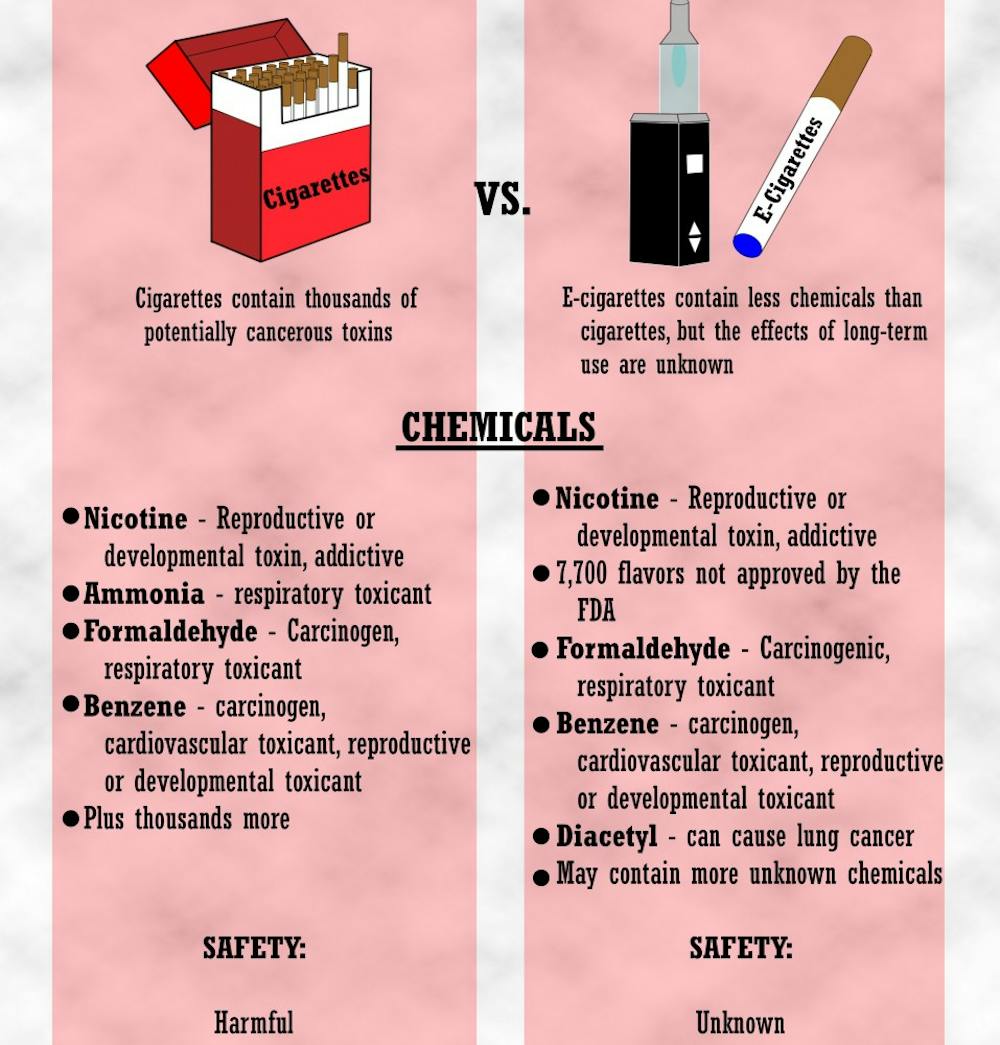Many ASU students have likely experienced the sensation of walking through a conspicuously fruity "vape" cloud.
Regardless of whether students view e-cigarettes as a fad or as a tobacco alternative, some students are unaware of where vaporizers stand in terms of campus rules.
ASU, like many universities nationwide, became tobacco-free in 2013. But e-cigarettes are a different story.
Joe Sanchez, manager of the ASU Tobacco-Free Initiative (ASUTFI), said that while all tobacco-containing products are prohibited on campus, e-cigarettes, which do not contain tobacco (but may contain nicotine), are approved for outdoor use on all ASU properties.
According to ASUTFI, products like e-cigarettes, nicotine gum and patches are currently permitted. Even though ASU is tobacco-free, nicotine is fair game.
"We can’t dictate to folks that you cannot smoke because it’s dangerous to your health, but we can make ASU a safe and secure community for those who don’t smoke," Sanchez said. "One of our main premises is that second-hand smoke does affect people."
This creates an issue for campus e-cigarette users, as it is currently unclear if second-hand vapor is harmful to bystanders.
Sanchez said he would support a no-vaping policy due to their potential health hazards, but added that without necessary data, changes won't happen.
As a result of the prohibitive regulations on this kind of research in the U.S., there is just as little data about the health consequences of vapor as there is about the use of e-cigarettes as an anti-smoking aid.
"I am personally an advocate of no vaporizers allowed on campus, but I’m not sure why the higher level administrators allow this,” Sanchez said.
Scott Leischow, a professor in the College of Health Solutions, believes that due to the lack of definitive research, banning e-cigarettes on campus may do more harm than good.
“If down the road we find that (e-cigarettes) are useful to help people quit smoking, then we’ve basically just created a situation where we ban something that is potentially helping a person get off of tobacco,” Leischow said.
“At this point, I’m not enthused about that kind of a ban in open public areas.”
Despite uncertainty of the risks, many e-cigarette users who formerly smoked cigarettes believe that the risks of vaping are far less than that of smoking. Furthermore, they attribute vaping to helping them kick the cigarette habit.
"I smoked a pack to a pack and half a day for about six years, and now I’ve been vaping for about the same amount time and bought one pack in that time period,” Matt Berger, owner of Butt-Out, an e-cigarette shop and lounge on Mill Avenue, said.
“That’s been the experience for me and a lot of my customers, including my staff."
According to the American Lung Association, because there have not been enough long-term studies on whether e-cigarette use can be an effective method to quit smoking cigarettes, the use of e-cigarettes as a smoking cessation aid is not recommended. Nevertheless, some e-cigarette users swear by it.
"I quit the summer going into my freshman year, and it took me probably about nine months to fully transition (into vaping)," Keith Wisniewski, a biochemistry senior at ASU and employee at Butt-Out, said. “I quit because I turned 18 and realized I can legally buy cigarettes now even though I am already a pack-and-a-half per day smoker, and that’s a great way to kill yourself by age 30."
As for the tobacco ban on campus, some e-cigarette users support it.
“Campus has become really nice because there aren’t cigarette butts everywhere. At the ASU bridge near physical sciences H-wing there were just clouds of smoke, and they’re not quite there anymore," Wisniewski said.
Nonetheless, there is still a need for smoking enforcement on campus. There are currently eight smoking-enforcement ambassadors employed by the university to uphold the regulation.
Student enforcement ambassadors can find anywhere from 10-15 people smoking per day.
Although these student ambassadors are permitted to issue citations and fines, they see education as the most important aspect of their job.
Each enforcement ambassador is equipped with pamphlets detailing ASU’s tobacco policy and information to educate smokers about the harms of second-hand smoke.
This nuanced issue has divided scientists, policy makers and students alike, but until definitive research is produced, students will continue to ease their vaporizer prohibition anxiety with fat clouds.
Clarification: Scott Leischow is a professor within the College of Health Solutions, but the program he is a part of is currently undergoing a name change.
Reach the reporter at snnoudal@asu.edu or follow @seannoudali on Twitter.
Like State Press on Facebook and follow @statepress on Twitter.





